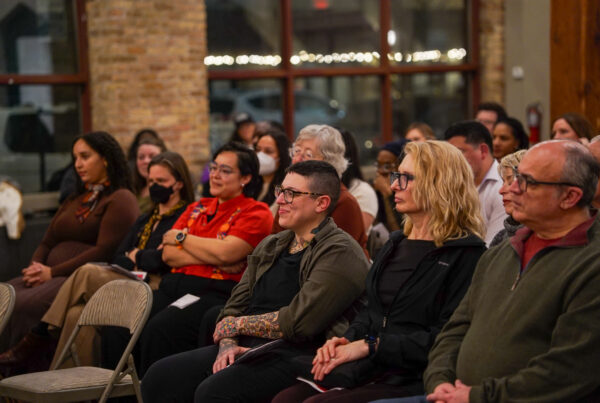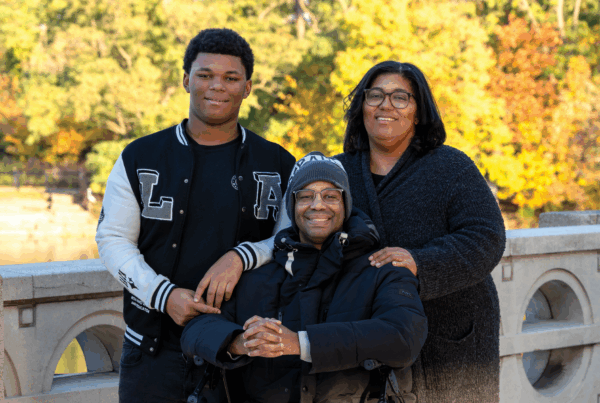Three bills to assist homeless youth — a CCH legislative package called Three Steps Home — have been enacted. All will take effect January 1, 2018.
Two measures were passed by the General Assembly and signed by Gov. Bruce Rauner. They will allow minors to access transitional housing as well as obtain counseling without requiring the consent of a parent or guardian.
A third measure, the College Hunger bill, faced an amendatory veto by the governor and was in the process of being reintroduced. But the Illinois Department of Human Services (IDHS) instead adopted a rule change in November that will allow low-income vocational students at community colleges to apply for SNAP food benefits.
State Legislative Director Niya Kelly spearheaded advocacy by CCH, including support from the 38-agencies on its Youth Committee. Services to homeless and at-risk youth have often been limited due to their young age and vulnerable circumstances.
HB3212 – Housing for Homeless Minors
Until HB3212 takes effect on January 1, homeless minors can stay in a youth transitional housing program for only 21 days before they must return home, move in with a relative, or go into the care of the Illinois Department of Children and Family Services (DCFS). Often, youth cycle through their 21 days, leave for a few days, and ultimately return to the program.
This legislation establishes a pathway for 16- and 17-year-old minors to find stable housing. They would be permitted to consent to their own housing and services with a DCFS-licensed youth transitional housing program when parental consent cannot be obtained. CCH worked with homeless youth service providers, Illinois Collaboration on Youth, and state agencies in drafting the legislation. Sponsors were State Rep. Litesa Wallace (D-Rockford) and State Sen. Donne Trotter (D-Chicago).
HB3709 – Increasing Access to Counseling Services
Youth can struggle in discussing their problems with parents or guardians. For this reason, Illinois law allows minors over age 12 to consent to counseling on their own. But until HB3709 takes effect on January 1, young people are limited to only five sessions, too few for youth that may not be ready to talk to their parents about personal struggles.
HB3709 increased the allotted number of sessions from five 45-minute sessions to eight 90-minute sessions. For minors unable to get parental consent, due to homelessness or possible dangers in getting parental consent, a counselor would be allowed to continue services after eight sessions. Consent would not be required for youth who reach age 17.
The legislation was drafted by CCH’s then-youth health attorney, Graham Bowman.
Said Dr. Niranjan S. Karnik, a leading psychiatrist at Rush University Medical Center, “Providers are in a good position to help heal families by working with youth who are running away, homeless or otherwise estranged. This legislation expands the possibility for youth to seek help from licensed providers, get short-term support, and it often leads to reunification with their families.”
Increasing the number of counseling visits gives youth the opportunity to build rapport with a counselor, giving youth a safe space to begin healing. Sponsors were Rep. Litesa Wallace (D-Rockford) and Sen. Kimberly Lightford (D-Westchester).
SB351- Food Insecurity on College Campuses/College Hunger Bill
Forty-eight percent of college students report experiencing food insecurity and 22% report having to skip meals in a recent national survey. Increased hunger on college campuses is associated with the rising cost of higher education, scarce financial aid, and the rapidly changing face of the traditional college student. Hunger has become a pressing issue in Illinois, especially among students at community colleges.
The Supplemental Nutrition Assistance Program, or SNAP food stamps program, can reduce food insecurity, but students attending college half-time or more have been ineligible. This legislation allows low-income community college students enrolled in vocational-track programs to further their education while having food security.
As HB3211, the SNAP bill passed the House, 85-25, in March, and the Senate, 50-1, in May. Gov. Rauner later issued an amendatory veto, saying he did not believe the Illinois Student Assistance Commission should be required to assist with implementation.
So a new bill – Senate Bill 351 – was introduced this fall. Called the “College Hunger bill,” it passed the Illinois Senate by a 54-1 vote on Oct. 25. But the measure failed to progress in the House before the veto session ended. Later in November, IDHS announced it was adopting a rule change to allow these students to apply for SNAP. An estimated 40,000 students could qualify.
CCH advocated this measure with the Sargent Shriver National Center on Poverty Law and Heartland Alliance for Human Needs & Human Rights. Sponsors were Rep. Litesa Wallace (D-Rockford) and Sen. Julie Morrison (D-Deerfield).
Many of the 38 youth-serving agencies on CCH’s Homeless Youth Committee endorsed these statewide measures. Twenty-five member agencies are located in Chicago, 13 in the suburbs and downstate.






